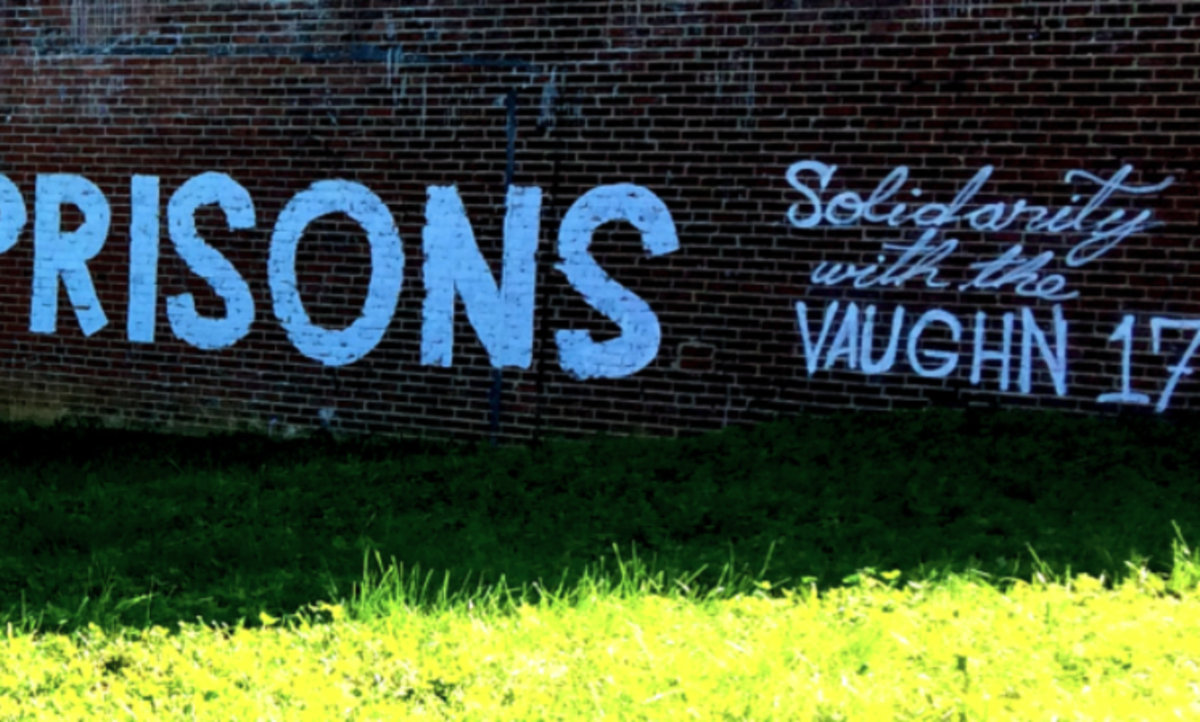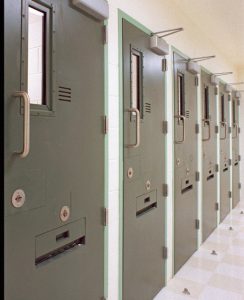
“Imagine sitting in a windowless 6-foot by 9-foot room the size of a bathroom for 23 hours a day, unable to communicate with family or anyone on the outside. The lights are on 24/7. The only drinking water you have is brown from rust. You constantly hear mentally ill people screaming and harming themselves. Within days of this torturous isolation you may begin to feel mental breakdown. Is this Guantánamo? Abu Ghraib? A torture chamber in some distant land? A torture chamber, yes, but a homegrown one. This is solitary confinement in a state prison near you.“
This quote is from an article I wrote in 2014. I was deeply worried about my son, a jailhouse lawyer and activist, during his 19-year incarceration. For nearly 10 of those years, he was tortured and retaliated against in solitary units throughout Pennsylvania, especially at Camp Hill, the processing prison for the Pennsylvania Department of Corrections.
The letters I received from SCI Dallas in March 2010 were heart- wrenching. He and five others held a peaceful protest and were brutally assaulted by armed guards and then later faced bogus riot charges. Charges that were brought as retaliation for filing complaints against the officers who attacked them.
The men came to be known as the Dallas 6. It took seven long years for them to beat the charges. Throughout those seven years and many years before and after, these men were retaliated against in every manner one can fathom.
Here it is in March 2019, and I receive a message that men from a Delaware prison are being retaliated against within solitary confinement in Pennsylvania. Unfortunately, the years may change, but the story remains the same. Their family members were worried because the men got a 5-minute call within 72 hours of arriving, but none after. They hadn’t heard from them in weeks. When they did, the letters were written on the back of orientation papers because the men were only given a small pen, one envelope and no paper. They complained of being denied meals, showers and other basic human rights that prisoners are entitled to. They talked about being walked on a dog chain to the showers.
They are locked in cells 23 hours without any belongings from the Delaware facility. During the move, their personal property was either “lost” or “damaged.”. They were not allowed to buy commissary or purchase writing materials.
I spoke to some of the family members who wished to remain anonymous in fear that their loved ones will be further retaliated against. One of them was finally was able to get a visit, but it was behind a window while he remained handcuffed. In most states, prisoners are usually incarcerated far from their home city, and it takes a lot to travel to visit. My heart goes to any family who now has to travel to another state for a visit.
The families spoke to a representative of the Delaware DOC about what was going on with the prisoner’s’ property and the men’s solitary confinement placement. They got the runaround from both Delaware and Pennsylvania. Typically, it is very hard to get the truth out of DOC officials. Cover-up seems to be their mission at every turn. So now there is the dilemma of having to deal with two state governments, which is very advantageous to Pennsylvania and Delaware prison officials. They can now both point the finger, and neither the prisoners nor their families can get resolution.

Vaughn 17 Uprising
I learned that the men being retaliated against are part of the Vaughn 17. Their story is a prime example of what is happening in prisons all over the country. Prisoners living under horrendous, inhumane conditions —, physically, mentally and environmentally —, take a stand. They fight for change the best way they can by filing grievances and complaints, which causes retaliation and further oppression. There are peaceful protests by prisoners and phone calls by their loved ones on the outside. On any given day, there is a hunger strike is going on in some prison across the United States.
There is always a lot of effort, but there is also a lot of pushback. When filing grievances and hunger strikes don’t work, how will your voice be heard? This iconic quote by Martin Luther King says it best:. “A riot is the voice of the unheard.”
On February 1st and 2nd, of 2017, a riot took place in protest of inhumane conditions at Vaughn Correctional Center in Smyrna, Delaware. One guard was assaulted, and another killed. Seventeen men were indicted and charged with riot, murder in the first degree, assault, kidnapping and second-degree conspiracy.
The trials were broken up into groups. So far, nine men have been to trial. Only one of them has been charged with murder. Many of them were found not guilty and exonerated of the charges. There are upcoming dates for the last two groups of men in May and October of 2019. A list of demands revealed the reasons behind the uprising and the conditions that led to it. Patricia May, a prison counselor that was taken hostage and released unharmed, told officials “inmates in the Delaware prison are sorely in need of better conditions, counseling and programs to help them rehabilitate. … [T]he state is jailing prisoners for ‘way too long’ and corrections officials are ‘antiquated in our thinking about treatment.’ They have to take these reforms seriously. If you take all their (inmates’) hope away, what do they have left?”
Delaware’s Governor Carney ordered an independent review of Vaughn Correctional Center, and it was found that there was overcrowding, understaffing, mismanagement, poor communication, a culture of negativity and adversarial relationships among prison staff, administrators and inmates. Due to the investigation, reforms were made in how the state treats its inmates.
There was a $7.5 million settlement on behalf of the prison staff affected by the riot. There are ongoing lawsuits by the prisoners focusing on their mistreatment before and after the incident. Well before February 2017, the prisoners were complaining about racism, abuse and torture. After the incident, prisoners said they received no medical or mental health treatment and still were still being beaten and abused by the guards.

Interstate Transfers and Solitary Confinement in Pennsylvania
Prisoners who speak up or dare protest the inhumanity of their surroundings are often are transferred to places where they can be further punished and abused. Sent away as to quiet their voice. Especially in the case of prisoners who are activists, jailhouse lawyers or those who have had confrontations with guards. In this case, a guard was killed, so there is no doubt a higher level of intensity in the retaliation these men will face a higher level of intensity in the retaliation.
Immediately following the uprising, Vaughn 17 prisoners were sent to Pennsylvania to face the same conditions they left in Delaware. Not just the Vaughn 17 prisoners are here, but due to a guard shortage, Delaware contracted to send over 300 prisoners to Pennsylvania at a cost of 40,000 per day. Those with short time left on their sentence are not supposed to be transferred to Pennsylvania, but in the case of the Vaughn 17, they were sent here anyway.
Some of the men, despite being exonerated, are receiving the same treatment as those charged with a crime and have been placed in solitary confinement. It is believed they were moved to Pennsylvania to retaliate, and this is not hard to believe. Their prison records were coded so they automatically would be placed in solitary confinement. This type of activity has been seen for years. My son was in general population in Pennsylvania, but because he was targeted, when he transferred to county jails for court, he was placed in solitary due to retaliatory coding and to further harass him.
Through my work with the Human Rights Coalition, tracking conditions in solitary confinement in our abuse logs, everything being reported by the men sounds very familiar. These were the same complaints I heard from my son and in the hundreds of letters we receive from Pennsylvania prisoners. Back in 2018, when the first prisoners started arriving from Delaware, I immediately began receiving letters that men with no misconducts or history of previously being in solitary, were being automatically placed in solitary.
Some were feeling the psychological effects and started feeling suicidal. There is no real psychological counseling in these units. I asked Pennsylvania Prison Society visitors to do wellness checks, as they are able to make unscheduled visits and see prisoners sooner. What I hear from the prisoners is that what constitutes a mental health assessment, is a drive-through session whereas a psych staff walks by the door and asks how you are, doesn’t stop, just keeps it pushing. Our tax dollars are paying for this.

There is a reason we do solitary well in Pennsylvania. Eastern State Penitentiary in Philadelphia is the first penitentiary in America and as well as the birthplace of solitary confinement. The thought was that the solace of isolation and a Bible would somehow reform the souls of the incarcerated. Hundreds of years later, the idea has spread all over the country and the world.
Solitary grew with the “get tough on crime” policies of the 1980s and 1990’s. During that time, the number of solitary units rose, and a large number of “supermax” prisons were built. The cost of solitary confinement at $77,000 is almost triple the cost of those incarcerated in general population.
Just as the prison system has its disparities, there are disparities among who is in solitary. Black people represent 38 percent% of the prison population but are 60 percent of those in solitary. Solitary is used as retaliation against the marginalized and disadvantaged populations such as Muslims and immigrants. Solitary is the number one tool of oppression in prisons. It is most often an effort to mute voices and break the spirit.
On April 19, I received a press release that seven of the men were moved. This was on the heels of a phone zap — call-in campaigns to put prisons on notice for abuses — organized by several organizations. Once again, there has been no contact to the outside. The family members remain vigilant, and a network of organizations will be working with them.
From my observation, there are two major reasons the Vaughn 17 prisoners were brought to Pennsylvania for two major reasons. One, to retaliate against prisoners who dare fight the system. Two, because incarceration is another capitalistic branch of the economy. Although the costs of incarceration are high, there is a billion-dollar industry in prison profiteering, which provides kickbacks, is a billion-dollar industry.
The Pennsylvania prison population is decreasing, and instead of moving toward a positive transformation, what do we do but replace that population with prisoners from another state? That says a lot, and none of it is good. The fact that solitary confinement has been weaponized should really cause concern. It does harm to people and should be abolished.
As prisons are a microcosm of our greater society, we must understand that every aspect of life inside of prisons mirror an aspect of society. The prison system is filled with racism, disparities and oppression.
Change can happen if we listen to the voices of those on the inside. Prisoners are merely are asking to be treated as human beings. They cannot continue to be muted and suppressed. That would be waiting for the powder keg to explode.
Starting in Delaware, Pennsylvania or another state, systemic changes need to occur simultaneously in our entire country. Now and immediately.
For updates and to learn more about the Vaughn 17, go here, or contact Fariha Huriya at vaughn17@protonmail.com.
Our Community Based News Room publishes the stories of people impacted by law and policy. Do you have a story to tell? Please contact us at CBNR. To support our Community Based News Room, please donate here.




